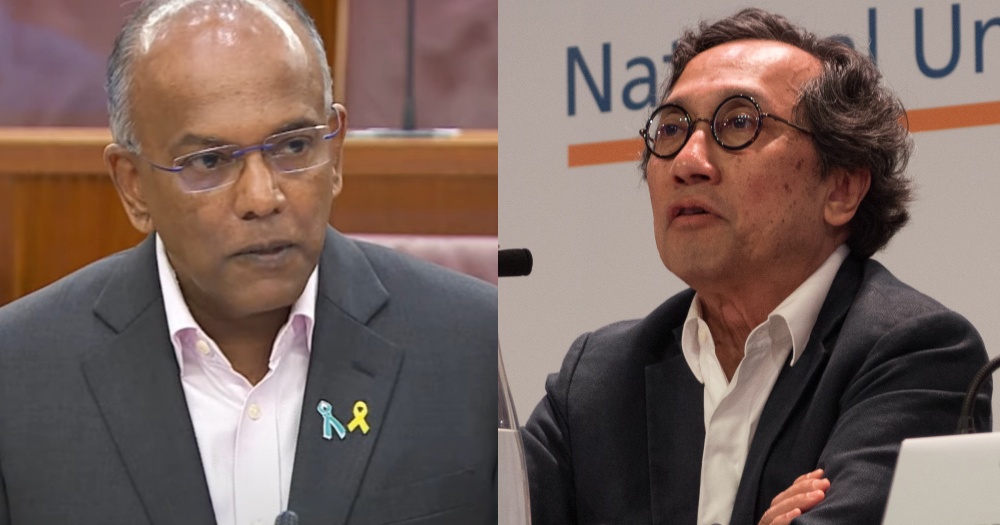"Both the Israeli and the Palestinian leadership have responsibility for the current situation, and the peace process not progressing," said Minister for Home Affairs and Law, K Shanmugam in his Facebook and Instagram post on Saturday (Nov. 18) evening.
Shanmugam was responding to a Nov. 11 op-ed in The Straits Times ("Hard truths about Gaza war’s cruel and complex dilemmas"), which was written by former permanent secretary of foreign affairs and current Middle East Institute chairman Bilahari Kausikan.
Israel's right to self-defence does not extend to "indiscriminate killing" of civilians
In his Facebook and Instagram post, Shanmugam said that his views "differ" from Bilahari.
While he noted that Bilahari's op-ed condemned Hamas's "unacceptable" attack on Oct. 7, Shanmugam pointed out that the op-ed did not "emphasise the illegal actions by the Israeli government over many years".
The "illegal actions" include the establishment of settlements in the West Bank and preventing a two-state solution, Shanmugam explained.
He also said that Bilahari's op-ed did not deal with the "severe restrictions that had been imposed on the population of Gaza, in effect denying any hope to the Palestinians".
"The truth is that Israeli Government actions have been contrary to international law, and oppressive to the Palestinians. One can say this while also accepting that parts of the Palestinian leadership has acted very badly, seeking the complete wipe out of Israel.
Both the Israeli and the Palestinian leadership have responsibility for the current situation, and the peace process not progressing.
In the context of what is now happening in Gaza: Israel has a right of self-defence. But this right does not extend to indiscriminate killing of civilians, or mass displacement of entire populations. Collective punishment is also illegal."
Shanmugam shared another op-ed offering another point of view
The scale of the tragedy in Gaza is "immense" and the devastation is "very difficult to accept", said Shanmugam.
He subsequently shared a link to another ST op-ed written by lawyer and community leader Ahmad Firdaus Daud.
Firdaus's op-ed was published on Nov. 18, in response to what Bilahari had written.
"[Firdaus's op-ed] puts forward another point of view, and is also worth reading," Shanmugam wrote, adding that Firdaus helps him "on-and-off" at his Meet the People Sessions.
Shanmugam ended his social media posts by focusing on the humanitarian efforts being made in Singapore.
"Meanwhile in Singapore, the Kong Meng San Monastery has donated S$50,000 to RLAF for people in Gaza. Very heartening. This is Singapore."
Bilahari's op-ed also resulted in an exchange with diplomat Tommy Koh
In a Nov. 17 op-ed in ST ("Gaza war: Hard truths and humanitarian law"), Tommy Koh, Ambassador-At-Large at the Ministry of Foreign Affairs (MFA) said that while he "agree with many points" in Bilahari's piece, he also disagreed with two of Bilahari's points.
First, Koh disagreed with Bilahari's statement that humanitarian law and the laws of war "take on a somewhat abstract quality as counsels of perfection".Second, Koh disagreed with his statement that Israel "will respect humanitarian law and the laws of war to the extent that it is practical".
Koh said that these laws are not abstract and Israel's obligation to comply with both is absolute and not only when it is "practical".
Lastly, Koh objected to Bilahari's statement that an independent Palestine will become "just another corrupt and badly governed Third World state".
Bilahari has since responded to Koh's op-ed in the forum page of The Straits Times ("International law not a tool fit for every purpose").
He said that the differences between him and Koh "are between the idealist and the realist", and they boil down to two key points.
First, Bilahari noted that "international law is only a tool of diplomacy and is not the only tool or one that is fit for every purpose", and on this, he "must agree to disagree" with Koh.
Second, Bilahari said that his conclusion on the "probability" of a Palestinian state rests on the "dismal record of the Palestinian Authority in the West Bank since 1994 and Hamas in Gaza since 2007".
Bilahari concluded on a conciliatory note, saying that "there is room for both idealists and realists in the conduct of international relations".
Related stories
Top images via MCI/YouTube & by Andrew Wong.
If you like what you read, follow us on Facebook, Instagram, Twitter and Telegram to get the latest updates.



